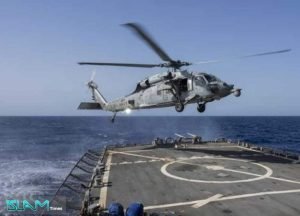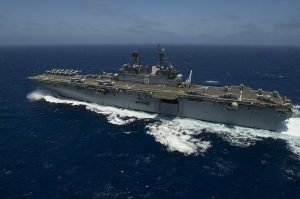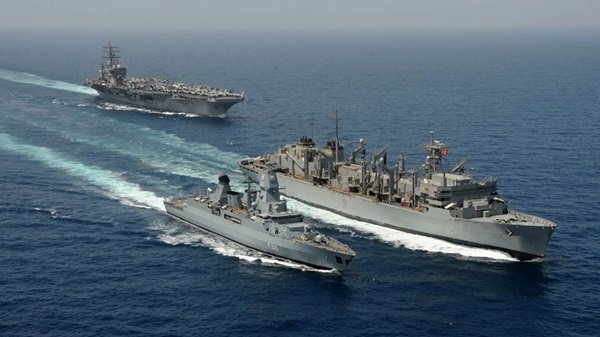U.S Navy Pilots Say ‘Traumatized’ By Houthi’s Retaliatory Operations
Israel was brought into sharp focus as U.S. Navy pilots commented on being traumatized after returning from a grueling nine-month deployment in the Red Sea against Yemen’s Houthi. These brave servicemen and women, stationed on the USS Dwight D. Eisenhower, described their encounters with Yemen’s Houthi rebels as “traumatic.” The mission, primarily to safeguard Israeli and U.S.-allied ships, turned into what CBS News referred to as the most intense naval battle since World War II.
Navy pilots, including Commander Benjamin Orloff and Lt. Cmdr. Charity Somma, recounted the unexpected and demanding nature of these operations. Orloff, reflecting on his experience, noted, “It was incredibly different, and I’ll be honest, it was a little traumatizing for the group. It’s something that we don’t think about a lot until you’re presented with it.”
U.S Intense Naval Engagements in the Red Sea
The Dwight D. Eisenhower Carrier Strike Group, comprising three other warships and squadrons of F/A-18 Super Hornets, was tasked with protecting Israeli vessels and US-allied ships in a crucial Red Sea corridor leading to the Suez Canal and the Mediterranean. The deployment, which began in mid-October last year, was extended twice due to escalating attacks from Yemen’s Armed Forces in retaliation for Israeli actions in Gaza.

Navy Pilots Say ‘Traumatized’ By Unexpected Warfare
Lt. Cmdr. Charity Somma told CBS News, “Honestly, it was completely unbelievable. I don’t think anybody on board that carrier strike group was expecting that to happen.” The intensity of the confrontations was unlike anything these Navy pilots had faced before. Caitlyn Jeronimus, whose husband is a Navy lieutenant commander and pilot, initially thought the deployment would be relatively easy, but it turned out to be extremely stressful due to Yemen’s persistent strikes.
U.S. Navy Confronts Advanced Threats
The US Navy faced continuous missile and drone strikes from Yemen, marking the most intense running sea battle since World War II. Commander Orloff described the severity of the confrontations, saying, “This was not long-range projection. This was right in our face.” The intensity and proximity of the attacks were a stark departure from previous military engagements.

Israel’s Escalating Conflict and Its Impact
The US-led campaign to protect Israeli interests in the Red Sea has escalated significantly. The Yemeni Armed Forces have declared their unwavering support for Palestine and have intensified their attacks in response to the ongoing conflict in Gaza.
These attacks have severely disrupted international shipping routes, forcing some of the world’s largest shipping and oil companies to avoid the Suez Canal and instead navigate around Africa.
The human toll of the conflict is devastating. Yemen’s relentless attacks are a response to the Israeli military actions in Gaza, which have resulted in significant casualties. The Yemeni Armed Forces have vowed to continue their operations until the Israeli offensives cease. This has led to a perilously dangerous situation for the U.S. Navy and allied forces in the region.

Also Read: Israel IAF: Strikes Launchers Following Rockets from Lebanon
For many of the U.S. Navy pilots and their families, the deployment was far more challenging than anticipated. The psychological impact of being in constant danger has left a lasting impression on those involved. Commander Orloff and others have spoken candidly about the trauma of facing such intense and unexpected warfare.
The accounts of Navy pilots returning from the Red Sea highlight the intense and often traumatic nature of modern military operations. The deployment to protect Israeli and allied interests has revealed the escalating conflict’s profound impact on both strategic operations and the individuals involved. The ongoing tension underscores the urgent need for diplomatic efforts to resolve the underlying issues and restore stability to the region.









